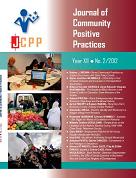CITIZENSHIP A TOOL OF SOCIAL INCLUSION AND EXCLUSION IN POST-APARTHEID SOUTH AFRICA
CITIZENSHIP A TOOL OF SOCIAL INCLUSION AND EXCLUSION IN POST-APARTHEID SOUTH AFRICA
Author(s): Sipho Jonathan NkambuleSubject(s): Social Sciences
Published by: Asociatia pentru Dezvoltare si promovare socio-economica Catalactica
Keywords: citizenship; social; inequality; exclusion; inclusion; gender
Summary/Abstract: During apartheid South Africa White minority had full citizenship and majority of the population had less or no entitlement to citizenship. When the democratic government resumed office, it attempted to create a new citizenry whereby everyone would have equal access to socio-economic and political citizen rights. The rise to power of the African National Congress brought hope to the historically exploited, excluded and oppressed populations. Furthermore, it gave a sense of entitlement among the historically marginalized mainly black population to the fruits of citizenship in the new democracy. The paper aims to evaluate whether universal citizenship have been achieved in the post-apartheid South Africa. The paper argues that although the South African constitution is based on common citizenship but there are many challenges in realization of this. Part of the reason for this was the adoption of a neoliberal macroeconomic policy which has hindered public institutions to effectively address the racial and social disparities of the past. In addition, social citizenship in the post-apartheid South Africa is used as a tool for exclusion and inclusion.
Journal: Jurnalul Practicilor Comunitare Pozitive
- Issue Year: XII/2012
- Issue No: 2
- Page Range: 170-185
- Page Count: 15
- Language: English

